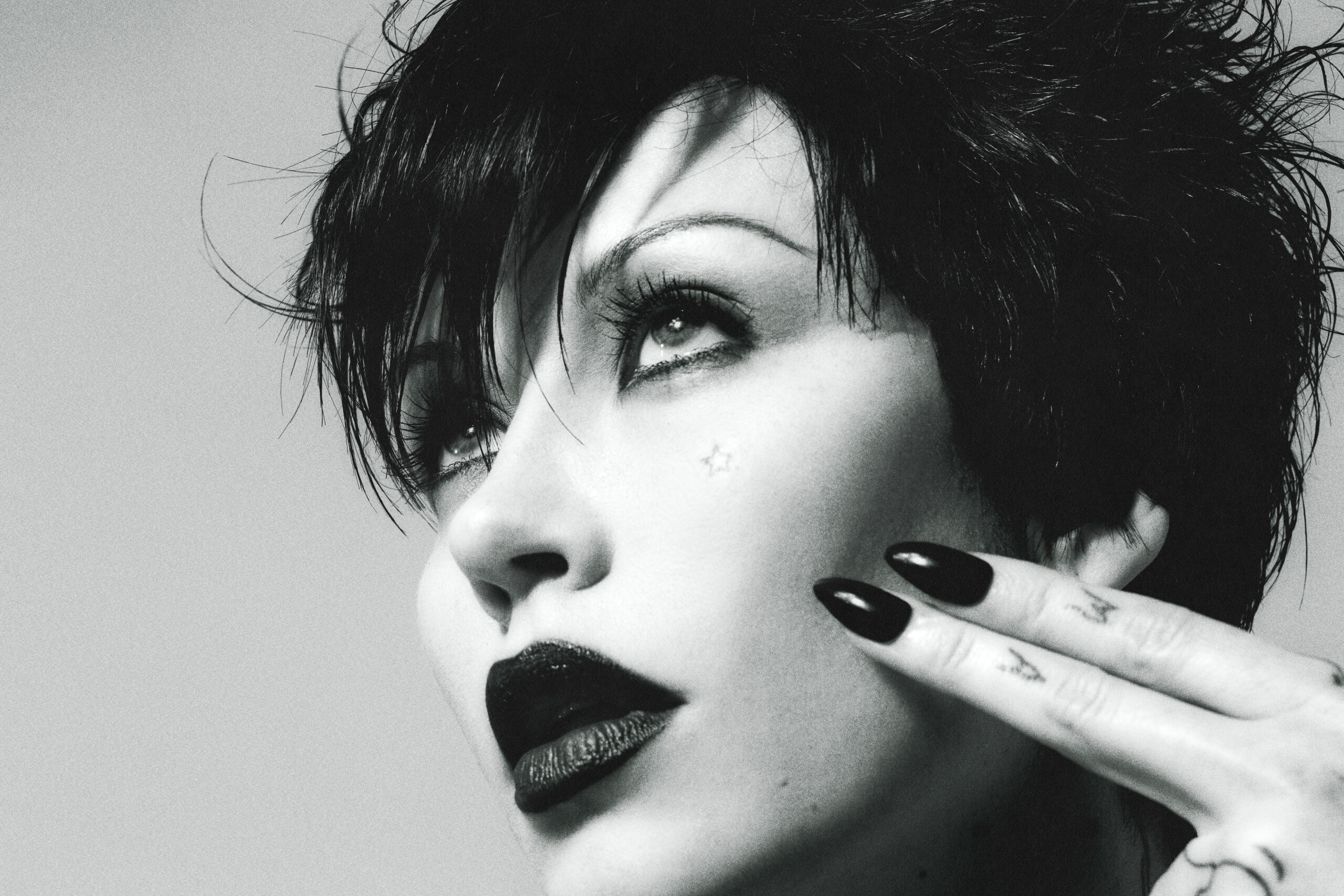Words by Willa Rudolph
Photo by Lanee Bird
Make-up by Shea Hardy
What originally hooked me to Madge was this eye-catching album cover. I thought – wow, who is this? Madge is a one-person multidisciplinary artist and musician based in Brooklyn, NY.

Upon listening to their new project, BOXJAR (released Nov. 17th) via AntiFragile Music, I was really impressed by everything about it! Madge is bringing something new to pop music. Their album is grungy, and it’s rock n’ roll, but it’s also gloomy pop electronica, all at once. The production is incredible, and the span of genres and sounds touched upon made my ears very happy. Madge cites such sonic inspirations as: “The Prodigy, American Football, Bad Brains, Elliot Smith, Boy music, generally.”
Mormon-raised and Brooklyn-based, Made was introduced to me by their team as “somewhat sad and angry.” Feel that. Anywho, they’ve also written for Pussy Riot, Brooke Candy, Yungblud, Travis Barker, and Slayyyter. This was the next thing that really set them apart from others in my eyes. Madge is a very accomplished songwriter. I admire this, and I am always so curious how writing songs for others differs from writing songs for yourself (see their answer to this question below).
The focus track from BOXJAR is “MACROWAVE,” which launches us into the album as the first song with a sludgy rock guitar riff before Madge’s dreamy and hypnotic vocals enter, singing sweetly and hauntingly, “I always felt like I’d have an expiration date…”
When the drums drop in, it’s a cluster fuck of punk rock and sirens until it goes back into the slower, quieter verse. “MACROWAVE” is a head-banger and a foot tapper at the same time. It’s abrasive, dark, and grungy, and as the first track off the record, it throws you hard into the deep end of Madge’s world. This track echoed elements of genre benders like 100 gecs and SOPHIE, touching on the beloved early 2000’s emo era of music and resting it’s tentacles in the land of futuristic pop.
For a DIY artist, Madge has many accolades. The non-binary artist has been featured in not one, but two Super Bowl commercials (see above), has collaborated with Kaskade, and one single from BOXJAR, “TALL GRASS” features renowned Alaskan-via-Portland rock band Portugal. The Man.
Madge elaborates on “TALL GRASS,” “I met Portugal. The Man via friends and immediately began to bug them about a collab. We bounced ideas back and forth for months and collaged together the final product as a Frankenstein of all our virtual exchanges. We have the most insane text trail of messages, lyrics, voice notes, and pics. I feel proud that we made it happen.“
Madge turns pop music on its head with their avant-garde take and by having hands in multiple genres: dark pop, hyperpop, indie rock, pop punk, the list really goes on. “TALL GRASS” is an utterly danceable and upbeat earworm of a pop song. Madge’s voice oscillates between a bratty little rock rap and the bubble gum vocals of a classic pop song. Portugal. The Man’s addition takes it to the next level, making it a duet full of grungy down strokes on guitar, autotuned backing vocals, thumping electronic drums, whining guitar moans, and lead vocals that fit within the center of the Venn diagram between indie-rock and pop vocals.
Read our interview with MADGE below:
WR: How has your Mormon upbringing influenced your music / writing?
Madge: I grew up with music as a big part of my life, and church was a major reason for this. My brain is still fairly Mormon, I would say. It’s also funny how as soon as someone finds out I was raised Mormon, it becomes my central narrative. I think music is a way for me to try to subvert that feeling of being the fundamentalist freak at the party.
WR: You’ve written music for artists like Pussy Riot, Brooke Candy, and Slayyyter. How does writing for other artists differ from writing your own music? Is it a different creative process? Do you use a different part of your brain?
Madge: It’s easier and more fun. It happens just as fast, but without the weight of “WhAt dOeS THiS mEAn”. I’m sure it’s the same part of my brain tho.
WR: What story are you telling with the album BOXJAR? If you don’t see it as telling a story, what statement do you feel it makes?
Madge: It’s a boy story. It’s a composite story about my dad’s death as it compares to my experience of sexual violence, both micro and macro, and how that has informed my historically destructive decision making. Ultimately, it’s quite absurd. It feels like a secondary emotion – anger. But the root of it is most likely despair.
WR: What’s your favorite song off the record?
Madge: That’s hard for me. I find myself going back to “BOXJAR” over and over – which, ironically, is the only song I didn’t even sing.
WR: How long have you been making music?
Madge: Since I was 4 years old, a baby. That’s when I started piano.
WR: What made you decide to take your own music public, rather than just writing for others?
Madge: It was simultaneous. One didn’t really come before the other.
WR: What do you like about living in New York? What’s good about living in New York when you’re a musician?
Madge: I love New York, and that’s why I love to live here. It feels like a place for artists rather than industry, and I like that. Plus, no one gives a fuck about you or your art, which I think is vital. I think we should stop praising artists so much.
WR: What’s your favorite thing about the NYC music scene versus others?
Madge: There will always be something reliably interesting going on in it, outside of which city is the current industry hub.
WR: Any shows coming up?
Madge: I’ll probably be DJ’ing somewhere in December.
